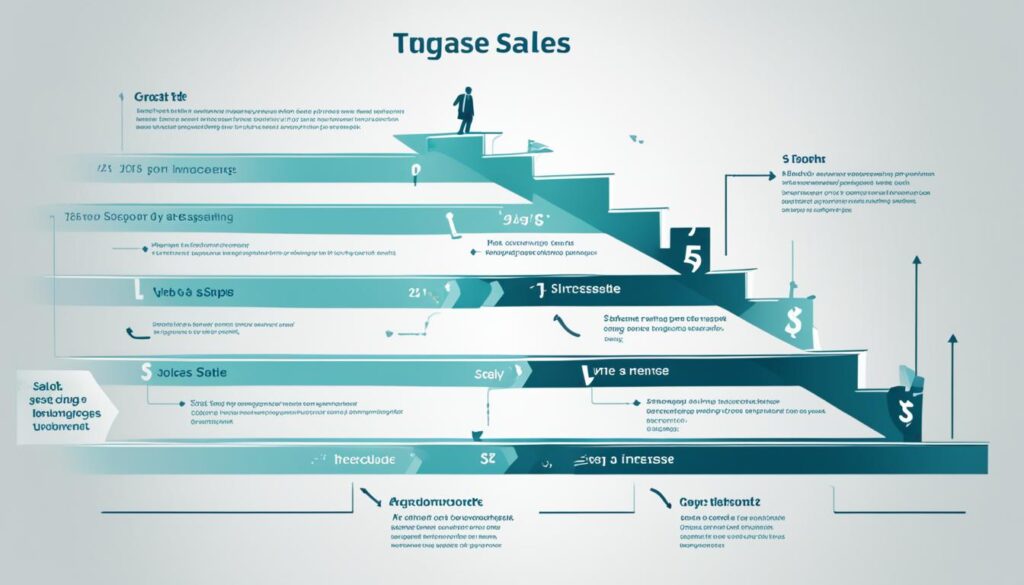Achieving Success: Setting Work Goals Effectively

Do you ever feel like you’re just going through the motions at work without any clear direction? Are you starting to question if there’s more to your career than just getting by? It’s time to challenge the status quo and ignite your professional growth.
Setting work goals is the key to unlocking your full potential and achieving success in the workplace. By defining specific targets and milestones, you can create a roadmap that guides you towards your ultimate career aspirations. But how do you set work goals effectively? And how can they really make a difference in your professional development?
In this article, we will explore the importance of setting work goals and provide you with practical strategies to establish meaningful objectives that propel your career forward. Discover how setting work goals can empower you to take control of your professional journey and unleash your true potential. Are you ready to step up and make a lasting impact?
Key Takeaways:
- Setting work goals is crucial for professional growth and success.
- Goals provide direction, clarity, and vision in your career.
- Effective goal setting involves using the SMART goals method.
- Inspiring work goal examples can help you get started.
- Strategies for achieving work goals pave the way for success.
The Importance of Setting Work Goals
Setting work goals is essential for several reasons. First, goals provide a measurable way to evaluate your growth and progress. Using the SMART goal method allows you to track your achievements and identify areas for improvement.
Secondly, goals provide a clear vision of what you want to achieve in your career, helping you stay focused and motivated. By setting career objectives, you create a roadmap that guides your actions and decisions, enabling you to make meaningful strides towards success.
Setting work goals also helps you stand out and be noticed for your ambitious efforts. By demonstrating a commitment to employee goal setting, you showcase your dedication and drive to personal and professional development. This can lead to increased confidence and career advancement opportunities.
Employing effective goal setting strategies allows you to align your ambitions with your career path. By setting goals that align with your values and aspirations, you create a sense of purpose and fulfillment in your work. This not only benefits your professional growth but also contributes to a more satisfying and rewarding career journey.

Now that you understand the importance of setting work goals, let’s explore how to set effective goals that propel you towards success.
How to Set Effective Work Goals
Setting effective work goals is essential for personal and professional growth. One effective method for goal setting is the SMART goals approach, which stands for Specific, Measurable, Attainable, Relevant, and Time-bound.
Specific: When setting work goals, it’s important to be specific about what you want to achieve. This means defining your goals in detail, such as learning a new skill or earning a promotion.
Measurable: Measurable goals are those that can be quantified or tracked. By setting measurable goals, you can monitor your progress and evaluate your achievements along the way. This helps to stay motivated and focused on reaching your desired outcomes.
Attainable: Setting attainable goals means selecting targets that are realistic and within your reach. While it’s important to aim high, setting unattainable goals can lead to frustration and demotivation. By setting goals that are attainable, you can maintain your motivation and avoid feeling overwhelmed.
Relevant: Work goals should align with your career and professional environment. They should be relevant to your current role or the direction in which you want to grow. By setting relevant goals, you can ensure that your efforts contribute to your overall professional development.
Time-bound: Time-bound goals have a specific timeline or deadline for completion. Time-bound goals provide a sense of urgency and help you stay accountable. Having a clear deadline can also help prioritize your actions and make progress towards your goals.
By following the SMART goals method, you can effectively set work goals that are meaningful, achievable, and aligned with your career aspirations. It helps you clarify your objectives, track your progress, and stay motivated throughout your journey.

Inspiring Work Goal Examples
To inspire individuals in setting their work goals, here are 10 examples to consider:
- Improve Time Management Skills: Set a goal to develop effective time management strategies to increase productivity and meet deadlines consistently.
- Enhance Communication Skills: Aim to improve interpersonal and written communication skills to communicate effectively with colleagues, clients, and stakeholders.
- Acquire New Technical Skills: Set a goal to learn a new programming language, software, or technology that will enhance your job performance and open new opportunities.
- Lead a Cross-Functional Project: Aspire to lead a cross-functional project that requires collaboration with colleagues from different departments to showcase your leadership skills and ability to work in diverse teams.
- Attain a Management Role: Set a long-term goal to earn a promotion to a management position by consistently demonstrating strong leadership abilities, results-driven performance, and strategic thinking.
- Complete Professional Certification: Commit to obtaining a professional certification relevant to your field, which will validate your expertise and showcase your commitment to continuous learning and growth.
- Expand Networking Connections: Set a goal to establish meaningful professional connections by attending industry events, joining networking groups, and reaching out to influential individuals in your field.
- Improve Work-Life Balance: Prioritize achieving a healthy work-life balance by setting boundaries, delegating tasks, and taking time for self-care and personal interests.
- Increase Revenue/Sales Targets: Set ambitious but attainable targets for increasing revenue or sales, pushing yourself to exceed expectations and contribute significantly to the organization’s growth.
- Mentor a Colleague: Aim to mentor and guide a junior colleague to help them develop their skills and reach their full potential, fostering a supportive and collaborative work environment.

Strategies for Achieving Work Goals
Successfully achieving work goals requires a proactive approach. By implementing the following tips, you can stay focused, motivated, and on track to completing your career goals:
- Set Specific and Clear Goals: Clearly define your goals by making them specific and actionable. This will provide you with a clear target to work towards.
- Break Down Goals into Smaller Tasks: Break down your larger goals into smaller, manageable tasks. This will make them less overwhelming and easier to accomplish.
- Create a Timeline: Establish a timeline for each goal and set deadlines for completing each task. This will help you stay accountable and ensure progress is being made.
- Prioritize Tasks: Determine the most important tasks that will directly contribute to achieving your goals. Focus on these tasks first to make the most significant impact.
- Stay Organized: Use tools, such as calendars, to keep track of your tasks and deadlines. Having a clear overview of your progress will help you stay organized and motivated.
Remember that achieving your work goals requires consistency, perseverance, and dedication. Stay committed to your goals and keep pushing forward, even when faced with challenges. Use each accomplishment as motivation to propel you towards even greater success.

Now that you have some strategies to help you achieve your work goals, let’s take a closer look at inspiring examples of work goals in the next section.
Conclusion
Setting work goals is a powerful tool for achieving success and personal growth in the workplace. It allows you to invest in your personal and professional development, enabling you to stay motivated, focused, and continuously strive towards your ambitions.
The SMART goals method provides a framework for setting effective goals that are specific, measurable, attainable, relevant, and time-bound. By following this method, you can ensure that your goals are well-defined and aligned with your overarching career objectives.
By setting inspiring and relevant goals, you can unlock your full potential and stand out in your chosen field. Remember, it’s not just about achieving short-term targets; it’s about long-term success and fulfillment. With the right strategies and mindset, you can take control of your professional journey, overcome challenges, and reach new heights in your career.






